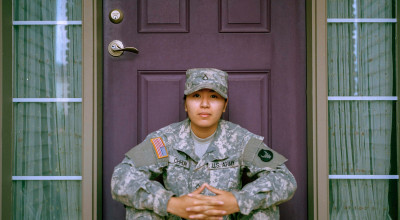Veteran and First Responder Families
October 9th, 2023
By P. Casey Arrillaga, LCSW, LCDC
It is well established that military and first responders (police, firefighters, EMS) are often dramatically impacted by their work. What gets less attention is how much of this impact is passed on to their families. This post will explore what is known about how the families are affected and what can be done to help.
What We Know So Far
Military and first responders [FR] regularly deal with stresses that most other people never have to face, including doing inherently dangerous work, seeing injury and death on a regular basis, and knowing these things could happen to them at any moment. Many are put in positions where they have to injure or kill others in the line of duty, things that go against their humanity and often their values, leading to a type of trauma known as moral injury. This is compounded by military and FR culture that often values stoicism over expression, let alone exploration and healing, of the types of emotions that such things naturally bring, such as sadness, horror, fear, and sometimes regret, guilt, and shame. As a result, military and FR personnel are very prone to mental health conditions including anxiety, depression, PTSD, and addiction, yet are discouraged from seeking help by the culture of their fields. These issues can thus persist long after retirement, and all too often go untreated.
Unfortunately, it is most often those closest military and RF personnel who are left to deal with the effects of all this. Research shows that spouses and children of military and RF personnel are prone to mental health challenges themselves as a result of being close to the stressful lifestyle. They are also prone to anxiety, depression, and PTSD. Spouses of FR often report high levels of stress due to the long hours their loved one is away, feeling like they are parenting alone, and constant fear that their loved one will get hurt.
Military families have all of the same issues plus the additional stress that comes with deployments, in which the military family member is typically gone for months at a time in environments that may be deadly, and unpredictable moves to anywhere in the country of the world that the military has a base. Research shows that children of service members typically need more mental health support directly after a move to a new area, and military families often are faced with many moves over the course of a career.
Military and FR families all are subject to vicarious or secondary trauma, which can spread like waves out from the family member who is under the stress and trauma that comes with those professions. This can come from hearing about the difficulties of the lifestyle, living with someone who has been physically or mentally injured, and due to the mood and personality changes that can accompany stresses endured in military or FR work. Unfortunately, military and FR personnel are at higher risk of mood swings, fits of rage, and domestic violence. They may also be more likely to abuse alcohol and sometimes other drugs, leading to all of the problems that come with these things.
Some families get a double dose of all of these issues when both parents are military or FR. Additionally, a fair number of people go into FR work after transitioning out of the military. Needless to say, either of these situations leads to greater stress and strain on the family system. This can lead to any number of mental health issues, including addiction to alcohol and other drugs.
What to Do if You or Someone You Know is Family to military and/or FR
If you or someone you know is family to military, veteran, or FR, it is important to get support for yourself and others in the family. The military, VA, and some FR departments offer some counseling and support. That being said, spouses of FR, military, and veterans say that there are not enough resources available, especially for children involved. This is not a slight on what the government offers, but more likely reflects that the problem is much bigger than any one organization can solve.
Instead, it is important for family members to find help and support from professionals who understand military and FR culture and the life that comes with it. It is also vital to move past the old “code of silence” and speak up honestly about any issues that are coming up for the family, including the military, veteran, and FR personnel themselves. Encourage loved ones to seek support, and set a positive example by doing so yourself.
It can also be very helpful to talk to other family members who know what this is like. If problems like addiction and other mental health issues are coming up, there are professional organizations and less-formal support groups for family members, such as SMART Recovery Family & Friends, or Al-Anon that offer support to anyone who is family to a person with addiction.
When treatment is needed, be sure to find it for yourself or a loved one in a place that understands military, veteran, and FR life. For instance, at Windmill, our Guadian Initiative program offers specialized groups and counseling for FR and military, both active and veteran. It is led by former FR and veteran staff, so our clients from these backgrounds know they are talking with someone who has both the personal experience and professional training to understand and help.
The Bottom Line
Military, veteran, and FR and their families face a unique set of stresses that affect everyone in the family. Therefore, they need extra support and help despite an internal culture that often says otherwise. It’s time to move past the “code of silence” and get these families the help they need from people who understand.
About The Author
P. Casey Arrillaga is the Team Leader for Education at Windmill Wellness Ranch, and he is the author of books including “Realistic Hope: The Family Survival Guide for Facing Alcoholism and Other Addictions”. His books, podcast, videos, etc. can be found at CaseyAuthor.com


